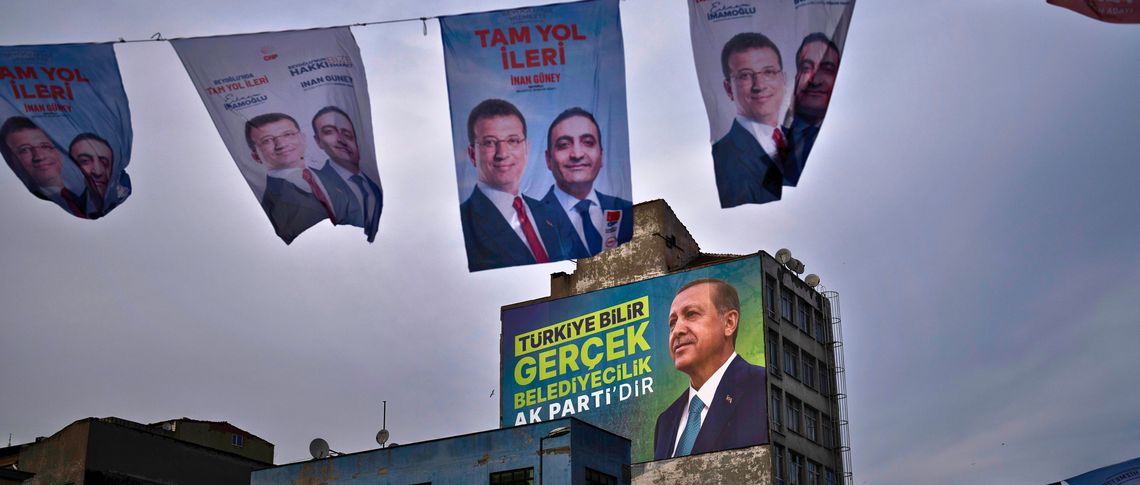Since the transition to a Presidential System in 2018, each election in Turkey has become more and more important, turning into a contest between President Recep Tayyip Erdoğan and those who oppose him. However, the upcoming local elections on 31 March might not be as critical as many point them out to be.
Firstly, the opposition’s defeat in 2023 has lowered expectations. And secondly, Turkey’s largest cities – Istanbul, Ankara and Izmir – are already governed by the opposition party CHP (The Republican People’s Party). Thus, Erdoğan’s defeat in these places wouldn’t necessarily cause a significant weakening of his power. On the other hand, the mayor of Istanbul, Ekrem İmamoğlu, is seen as the most powerful opposition politician in Turkish politics. If he lost the elections, this would mean the weakening of a strong rival, making the Istanbul elections the most crucial of them all.
A period of crises
While heading into the 2023 elections, the current administration had been going through a crisis-ridden period. And voters have felt this: since 2018, Turkey has been in an economic crisis, and inflation rates have significantly risen, even according to controversial official statements: 6.4 per cent in 2010 and 64.8 per cent in 2023.
Moreover, during the more than 20 years of Erdoğan’s administration, Turkey experienced a significant democratic decline. According to the Economist Intelligence Unit’s Global Democracy Report, while Turkey was ranked 88th among 167 countries in 2000, it stood at 102nd in 2023. Consequently, the country is now categorised as having a hybrid regime, combining elements of formal democracy and authoritarianism.
In 2023, a significant earthquake disaster took place. Two quakes with magnitudes of 7.6 and 7.7 hit the country on the same day. Based on official data, a total of 53 537 individuals lost their lives. The centralised government received intense criticism due to urbanisation and construction amnesty laws, which worsened the impacts of the earthquakes, as well as its ineffective response to the disaster.
All these factors raise the question: How did the ruling party still manage to win the 2023 elections?
A matter of presentation
One explanation is that the impact of the earthquakes on voting behaviour was very low. Public opinion surveys conducted before and after the events showed no substantial loss of support for the government. This is due to several reasons;
First of all, the ruling party managed to frame the disaster as a natural catastrophe of extraordinary magnitude. By labelling them as the ‘disaster of the century’, they enabled the earthquakes to be perceived as a national disaster. Its devastating effects were considered inevitable and impossible to cope with. A fundraising campaign was launched where companies, even public institutions, were encouraged (and forced) to donate. And the live broadcasts of the 24-hour rescue operations helped to preserve national unity rather than engage in (opposition) politics. In addition, the ruling party targeted certain contractors, making them the biggest culprits. The public administration’s share in the destruction thus became trivialised in the eyes of the voters.
At the same time, CHP’s active communication pointing to the delay and malfunctions in the access to the rescue operation area, as well as the government’s responsibility for the extent of the disasters’ impact, was framed as political opportunism.
Erdoğan’s AKP is seen as a party that has proven ‘hard skills’ among the public. CHP, on the other hand, is viewed as a party with well-developed ‘soft skills’ but weak hard skills. Therefore, following the quakes, a strong belief developed that the AKP would be better suited to handle the significant reconstruction period. Additionally, the government promised to deliver housing within a year, which helped soothe public anger.
It seems as if many voters trust the government’s problem-solving capacity more than that of the opposition.
On the other hand, failures to manage other crises during fires and floods between 2020-2022, mining accidents and urbanisation problems are more clearly associated with the government’s 20 years of experience, as the connections between its shortcomings and the events are easier to establish. The recent gold mine accident in Erzincan is weakening the chances of Murat Kurum, the former minister of environment and urbanisation and the AKP’s Istanbul candidate in the upcoming elections.
When determining their votes, voters often focus on who may solve their problems better. And it seems as if many voters trust the government’s problem-solving capacity more than that of the opposition. Even in the earthquake zone, the need to recover the destroyed cities led the electorate to support the current government. As a result, even as problems intensify, voters find the prospect of a change in government risky.
Another weakness of the opposition is its lack of unity. It is not a homogeneous group but, instead is made up of three segments that are not easy to unify: CHP (Leftist Kemalism), İYİ Party (a nationalist right-wing party) and DEM (the party representing the Kurds).
On the other hand, the harmony between the devout conservative AKP and the nationalist conservative MHP in power has never been significantly disrupted. Only YRP (The New Welfare Party) constitutes an exception on the government side. Although YRP was part of the ruling alliance, it opposed the government with its claim of ethical Islamism.
What does this mean for the upcoming local elections?
While the government is, in fact, losing support, this has yet to lead to a loss of votes. Nonetheless, Erdoğan is not as powerful as he used to be.
In the 2023 elections, the total votes of the two major ruling parties, AKP and MHP, fell from 53.6 per cent in 2018 to 45.7 per cent, and Erdoğan could not surpass Kılıçdaroğlu in the three largest cities (which house one-third of Turkey’s population). Considering that the segments most affected by the economic decline live in these metropolises, the signs indicate that support for the government will continue to decrease.
In the upcoming local elections, however, there are some significant differences compared to 2023; First, there is an increased apathy and indifference towards politics. Voters don’t believe that they can influence current politics anymore. This is compounded by a general distrust in politics. However, those discontent with the ruling party often also disapprove of the opposition. As a result, both lose the sense of political efficacy.
Criticisms of the AKP for maintaining its commercial relations with Israel and other accumulated grievances make the YRP a station for those who have broken away from the government but do not want to join the opposition.
Second, in the critical cities of Ankara and Istanbul, opposition mayors who are running for office again do not pose a lifestyle threat to the devout with their central and nationalist politics. That is because the social policy approaches of both mayors make their services facilitate the daily lives of women, youth and those in need, giving them an advantage in this aspect.
Third comes the dissolution of the alliances formed within the opposition in 2023 — another unique aspect of the upcoming elections. During the local elections held in 2019 in Istanbul, all opposition factions backed a single candidate. Now, CHP, İYİ Party and DEM, which have the most public support, are entering the elections with their respective candidates. They thus need to convince voters at the grassroots level.
The ruling party is also facing some drawbacks. First, MHP nationalist voters find it challenging to support the AKP in the local elections. Second, the YRP has also fielded candidates – meaning that the votes will be divided – resulting in the AKP candidate likely receiving fewer votes. Criticisms of the AKP for maintaining its commercial relations with Israel after its attack on Gaza and other accumulated grievances make the YRP a station for those who have broken away from the government but do not want to join the opposition.
All in all, although the results of the March 31 elections will most probably not lead to significant changes, they will be important for parties to decide how to steer their policies in the coming years.






